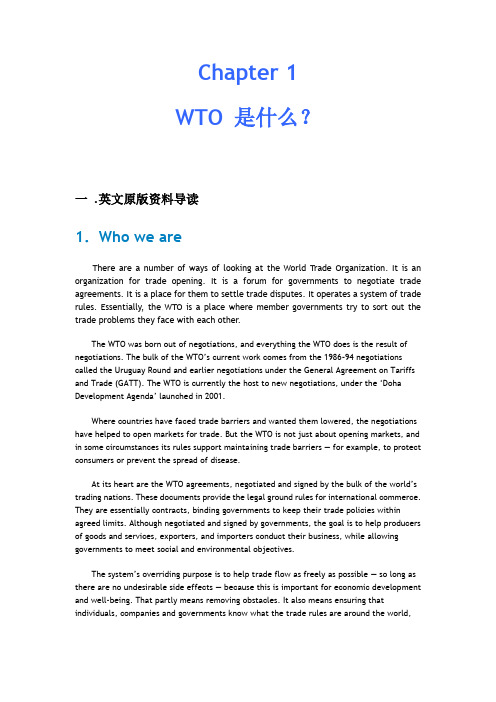WTO英文介绍
wto组织的英文作文

wto组织的英文作文(中英文实用版)The World Trade Organization,WTO, serves as a crucial institution in the realm of international trade, fostering an environment that promotes economic growth and cooperation among member states.With its headquarters in Geneva, Switzerland, the WTO operates under the principles of transparency, non-discrimination, and rule-based systems.世界贸易组织(WTO)在国际贸易领域发挥着至关重要的作用,它为成员国之间的经济成长与合作创造了有利环境。
总部位于瑞士日内瓦的世贸组织,遵循透明度、非歧视和基于规则的原则运作。
Established in 1995, the WTO replaced the General Agreement on Tariffs and Trade (GATT) and currently encompasses 164 member countries, accounting for over 98% of global trade.Its primary objectives include ensuring the smooth flow of goods and services, protecting intellectual property rights, and resolving trade disputes.成立于1995年的世贸组织取代了关税及贸易总协定(GATT),目前拥有164个成员国,涵盖全球98%以上的贸易。
关于经济的一些英文缩写

1.WTO:(World Trade Organization )世界贸易组织(简称世贸组织)是负责监督成员经济体之间各种贸易协议得到执行的一个国际组织,前身是1948年开始实施的关税及贸易总协定的秘书处。
成立于1994年4月,1995年1月1日正式开始运作,负责管理世界经济和贸易秩序,总部设在瑞士日内瓦莱蒙湖畔。
世贸组织是一个独立于联合国的永久性国际组织,具有法人地位,在调解成员争端方面具有更高的权威性。
与国际货币基金组织、世界银行一起被称为世界经济发展的三大支柱。
1999年11月15日,中国和美国签署关于中国加入世界贸易组织的双边协议。
2001年11月10日,中国被批准加入世界贸易组织。
2001年12月11日,中国正式成为其第143个成员。
截至2013.3.2世界贸易组织共有159个成员。
世界贸易组织是多边贸易体制的法律基础和组织基础,是众多贸易协定的管理者,是各成员贸易立法的监督者,是就贸易进行谈判和解决争端的场所。
是当代最重要的国际经济组织之一,其成员间的贸易额占世界贸易额的绝大多数,被称为“经济联合国”。
2.UN:(United Nations)联合国是1945年第二次世界大战后成立的国际组织,是一个由主权国家组成的国际组织,在1945年10月24日在美国加州旧金山签定生效的《联合国宪章》标志着联合国正式成立。
联合国致力于促进各国在国际法、国际安全、经济发展、社会进步、人权及实现世界和平方面的合作。
联合国现在共有193个成员国,总部设立在美国纽约、瑞士日内瓦、奥地利维也纳、肯尼亚内罗毕等地。
联合国官方正式使用的语言只有6种,按英文字母顺序为阿拉伯语、汉语、英语、法语、俄语、西班牙语。
6种语言同等有效,代表们发言时可以任意选用其中一种。
秘书处日常使用的工作语言则是英语和法语,但实际上英语使用最为广泛。
联合国在维护世界和平,缓和国际紧张局势,解决地区冲突方面,在协调国际经济关系,促进世界各国经济、科学、文化的合作与交流方面,都发挥着积极的作用。
WTO重要成员国简介

WTO英 [,dʌblju:ti:'əu]World Trade Organization 世界贸易组织since 30 November 2015 , The WTO have 162 members in all.世贸组织总部设在瑞士日内瓦莱蒙湖畔。
The world trade organization (wto) headquarters in Geneva lake lemoneInformation about the institution:The WTO is a rules-based, member-driven organization — all decisions are made by the member governments, and the rules are the outcome of negotiations among members. 信息机构:世界贸易组织是一个基于规则的,会员推动型组织——所有的决定是由成员国政府,和成员之间的规则是谈判的结果。
Any state or customs territory having full autonomy in the conduct of its trade policies may become a member (“accede to”) the WTO, but all WTO members must agree on the terms. This is done through the establishment of a working party of WTO members and through a process of negotiations.任何国家或海关领土完全自治的行为其贸易政策可能成为(“加入”)世贸组织成员,但所有世贸组织成员必须达成一致。
这是通过建立一个世贸组织成员的工作小组,通过一个谈判的过程。
WTO是什么意思

WTO是什么意思wto 是什么意思?想必有许多同学并不清楚。
wto 是世界贸易组织,英文全称: the Organization for Trade in Goods and Services,它的含义是指世界上最大的一个自由贸易区组织。
其宗旨是推动贸易自由化和经济全球化,建立一个更具活力的世界经济体系,创造有利于发展中成员的机会,促进成员之间的平等互利,提高开放型世界经济的运行效率。
wto 的宗旨就是保护公民在国际贸易领域内享受平等权益,通过协商解决争端,实现共赢;最终实现维护市场经济秩序和保障各国合法权益的目标。
作为世界性经济贸易组织, wto 将使全球贸易和投资得到显著增长,给各国企业带来巨大的发展机遇。
人们为何关注 WTO?那些没能参与 WTO 的国家和地区又如何看待这件事情呢?下面我来谈谈我的看法。
加入 WTO 对我国的政治、经济、文化生活都会产生重大影响,具体表现为四个方面:(1)有利于我国改革开放的继续深入。
外国资本涌入,冲击了传统观念,扩大了社会分配差距。
同时也引起社会阶层结构的变化。
新的社会群体产生。
如果你在海外工作过或者留学过,应该知道外国的月亮比较圆吧!每年我国都要花费数千亿美元用于接纳外资,吸收外资,引进技术设备,让外资从东部沿海城市向西部开发地区流动,既发挥了资金密集型的优势,又扩大了农村剩余劳动力的转移,还可以加快城镇基础设施建设步伐,特别是交通网络的完善速度。
因此,只有改革开放才能把封闭的旧中国逐渐变成充满生机的新世纪。
在计划经济条件下,中央集权的行政管理模式使中国经济几乎停滞不前。
而在全球经济一体化的今天,每个中国企业、单位都需要主动适应瞬息万变的国际环境,积极参与国际竞争,争取获得稳定、可靠、及时的原料供应,降低经营风险。
这种适应是难以避免的。
谁先抢占先机,抢抓机遇,谁就能够从容应付复杂多变的国际局势。
所以说,无论对政府机构、企业、科研院所、大专院校还是每个普通百姓,这种深刻的影响和冲击都是不言而喻的。
wto英文

Chapter 1WTO 是什么?一 .英文原版资料导读1.Who we areThere are a number of ways of looking at the World Trade Organization. It is an organization for trade opening. It is a forum for governments to negotiate trade agreements. It is a place for them to settle trade disputes. It operates a system of trade rules. Essentially, the WTO is a place where member governments try to sort out the trade problems they face with each other.The WTO was born out of negotiations, and everything the WTO does is the result of negoti ations. The bulk of the WTO’s current work comes from the 1986–94 negotiations called the Uruguay Round and earlier negotiations under the General Agreement on Tariffs and Trade (GATT). The WTO is currently the host to new negotiations, under the ‘DohaDev elopment Agenda’ launched in 2001.Where countries have faced trade barriers and wanted them lowered, the negotiations have helped to open markets for trade. But the WTO is not just about opening markets, and in some circumstances its rules support maintaining trade barriers — for example, to protect consumers or prevent the spread of disease.At its heart are the WTO agreements, negotiated and signed by the bulk of the world’s trading nations. These documents provide the legal ground rules for international commerce. They are essentially contracts, binding governments to keep their trade policies within agreed limits. Although negotiated and signed by governments, the goal is to help producers of goods and services, exporters, and importers conduct their business, while allowing governments to meet social and environmental objectives.The system’s overriding purpose is to help trade flow as freely as possible — so long as there are no undesirable side effects — because this is important for economic development and well-being. That partly means removing obstacles. It also means ensuring that individuals, companies and governments know what the trade rules are around the world,and giving them the confidence that there will be no sudden changes of policy. In other words, the rules have to be ‘transparent’ and predictable.Trade relations often involve conflicting interests. Agreements, including those painstakingly negotiated in the WTO system, often need interpreting. The most harmonious way to settle these differences is through some neutral procedure based on an agreed legal foundation. That is the purpose behind the dispute settlement process written into the WTO agreements.2. What we doThe WTO is run by its member governments. All major decisions are made by the membership as a whole, either by ministers (who usually meet at least once every two years) or by their ambassadors or delegates (who meet regularly in Geneva).While the WTO is driven by its member states, it could not function without its Secretariat to coordinate the activities. The Secretariat employs over 600 staff, and its experts — lawyers, economists, statisticians and communications experts — assist WTO members on a daily basis to ensure, among other things, that negotiations progress smoothly, and that the rules of international trade are correctly applied and enforced.Trade negotiationsThe WTO agreements cover goods, services and intellectual property. They spell out the principles of liberalization, and the permitted exceptions. They include individual countries’ commitments to lower customs tariffs and other trade barriers, and to open and keep open services markets. They set procedures for settling disputes. These agreements are not static; they are renegotiated from time to time and new agreements can be added to the package. Many are now being negotiated under the Doha Development Agenda, launched by WTO trade ministers in Doha, Qatar, in November 2001.Implementation and monitoringWTO agreements require governments to make their trade policies transparent by notifying the WTO about laws in force and measures adopted. Various WTO councils and committees seek to ensure that these requirements are being followed and that WTO agreements are being properly implemented. All WTO members must undergo periodic scrutiny of their trade policies and practices, each review containing reports by the country concerned and the WTO Secretariat.Dispute settlementThe WTO’s procedure for resolving trade quarrels under the Dispute Settlement Understanding is vital for enforcing the rules and therefore for ensuring that trade flowssmoothly. Countries bring disputes to the WTO if they think their rights under the agreements are being infringed. Judgements by specially appointed independent experts are based on interpretations of the agreements and individual countries’ commitments.Building trade capacityWTO agreements contain special provision for developing countries, including longer time periods to implement agreements and commitments, measures to increase their trading opportunities, and support to help them build their trade capacity, to handle disputes and to implement technical standards. The WTO organizes hundreds of technical cooperation missions to developing countries annually. It also holds numerous courses each year in Geneva for government officials. Aid for Trade aims to help developing countries develop the skills and infrastructure needed to expand their trade.OutreachThe WTO maintains regular dialogue with non-governmental organizations, parliamentarians, other international organizations, the media and the general public on various aspects of the WTO and the ongoing Doha negotiations, with the aim of enhancing cooperation and increasing awareness of WTO activities.3.What we stand forThe WTO agreements are lengthy and complex because they are legal texts covering a wide range of activities. But a number of simple, fundamental principles run throughout all of these documents. These principles are the foundation of the multilateral trading system.Non-discriminationA country should not discriminate between its trading partners and it should not discriminate between its own and foreign products, services or nationals.More openLowering trade barriers is one of the most obvious ways of encouraging trade; these barriers include customs duties (or tariffs) and measures such as import bans or quotas that restrict quantities selectively.Predictable and transparentForeign companies, investors and governments should be confident that trade barriers should not be raised arbitrarily. With stability and predictability, investment is encouraged, jobs are created and consumers can fully enjoy the benefits of competition — choice and lower prices.More competitiveDiscouraging ‘unfair’ pra ctices, such as export subsidies and dumping products at below cost to gain market share; the issues are complex, and the rules try to establish what is fair or unfair, and how governments can respond, in particular by charging additional import duties calculated to compensate for damage caused by unfair trade.More beneficial for less developed countriesGiving them more time to adjust, greater flexibility and special privileges; overthree-quarters of WTO members are developing countries and countries in transition to market economies. The WTO agreements give them transition periods to adjust to the more unfamiliar and, perhaps, difficult WTO provisions.Protect the environmentThe WTO’s agreements permit members to take measures to protect not only the environment but also public health, animal health and plant health. However, these measures must be applied in the same way to both national and foreign businesses. In other words, members must not use environmental protection measures as a means of disguising protectionist policies.4.Mission statement—a statement by the Director-GeneralThe World Trade Organization — the WTO — is the international organization whose primary purpose is to open trade for the benefit of all.The WTO provides a forum for negotiating agreements aimed at reducing obstacles to international trade and ensuring a level playing field for all, thus contributing to economic growth and development. The WTO also provides a legal and institutional framework for the implementation and monitoring of these agreements, as well as for settling disputes arising from their interpretation and application. The current body of trade agreements comprising the WTO consists of 16 different multilateral agreements (to which all WTO members are parties) and two different plurilateral agreements (to which only some WTO members are parties).Over the past 60 years, the WTO, which was established in 1995, and its predecessor organization the GATT have helped to create a strong and prosperous international trading system, thereby contributing to unprecedented global economic growth. The WTO currently has 153 members, of which 117 are developing countries or separate customs territories. WTO activities are supported by a Secretariat of some 700 staff, led by the WTODirector-General. The Secretariat is located in Geneva, Switzerland, and has an annualbudget of approximately CHF 200 million ($180 million, €130 million). The three official languages of the WTO are English, French and Spanish.Decisions in the WTO are generally taken by consensus of the entire membership. The highest institutional body is the , which meets roughly every two years. A conducts the organization's business in the intervals between Ministerial Conferences. Both of these bodies comprise all members. Specialised subsidiary bodies (Councils, Committees,Sub-committees), also comprising all members, administer and monitor the implementation by members of the various WTO agreements.More specifically, the WTO's main activities are:negotiating the reduction or elimination of obstacles to trade (import tariffs, other barriers to trade) and agreeing on rules governing the conduct of international trade(e.g. antidumping, subsidies, product standards, etc.)— administering and monitoring the application of the WTO's agreed rules for trade in goods, trade in services, and trade-related intellectual property rights— monitoring and reviewing the trade policies of our members, as well as ensuringtransparency of regional and bilateral trade agreements— settling disputes among our members regarding the interpretation and application of the agreements— building capacity of developing country government officials in international trade matters— assisting the process of accession of some 30 countries who are not yet members of the organization— conducting economic research and collecting and disseminating trade data in support of the WTO's other main activities— explaining to and educating the public about the WTO, its mission and its activities.The WTO's founding and guiding principles remain the pursuit of open borders, the guarantee of most-favoured-nation principle and non-discriminatory treatment by and among members, and a commitment to transparency in the conduct of its activities. The opening of national markets to international trade, with justifiable exceptions or with adequate flexibilities, will encourage and contribute to sustainable development, raise people's welfare, reduce poverty, and foster peace and stability. At the same time, such market opening must be accompanied by sound domestic and international policies that contribute to economic growth and development according to each member's needs and aspirations.二.New words and expressions1. painstakingly adv. 煞费苦心地;费力地2. the bulk of 大多数,大部3. overriding adj. 高于一切的,最重要的v. 践踏;压垮;不顾(override 的ing形式)4. transparent adj. 透明的;显然的;易懂的;坦率的5. predictable adj. 可预言的6.ambassador n. 大使;使节;代表7. delegate vt. 委派…为代表n. 代表8. secretariat n. 秘书处;书记处;秘书(书记,部长等)之职9. parliamentarian n. 国会议员,熟练而又有经验的议员adj. 议会的10. discriminate vt. 区别;辨别;歧视vi. 区别;辨别;歧视11. arbitrarily adv. 武断地;反复无常地;专横地12. transition periods [经] 过渡时期13. prosperous adj. 繁荣的;兴旺的14. predecessor n. 前任,前辈15. subsidiary bodies:附属机构16.foster vt. 养育,抚育;培养;抱(希望等)adj. 收养的,养育的17. aspiration n. 渴望;抱负;呼气;吸引术三.Legal Terms1. World Trade Organization 世界贸易组织(产生于关贸总协定的乌拉圭谈判,其目的是为促进多边贸易谈判和协议而成立的。
英文世界贸易组织(最全版)PTT文档

operation of the covered agreements. notify changes in trade policies to the WTO.
One of the 23 original signatories of the General Agreement on Tariffs and Trade (GATT) in 1948.
1948-1994, GATT provided the rules for much of the world trade.
The predecessor of WTO.
After eight GATT trade rounds(贸易回合谈判), WTO was born in Jan. 1st ,1995.
Establishment (GATT-WTO)
1947, General Agreement on Tariffs and Trade(GATT) .(关 税与贸易总协定)
In the wake of “Bretton Woods” institutions(布雷顿 森林体系 )-the World Bank and the International Monetary Fund.
Basic information
Reciprocity
Establishment (GATT-WTO)
1st ,1995.
Not allowed to take unfair trade practices to compete , such as Dumping and subsidies.
It provides Fair competition
The WTO members are required to publish their trade regulations, to respond to requests for information by other members, and to notify changes in trade policies to the WTO.
介绍世贸组织英语作文
介绍世贸组织英语作文The World Trade Organization (WTO) is an international organization that deals with the global rules of trade between nations. It aims to ensure that trade flows as smoothly, predictably and freely as possible.The WTO was established in 1995 and is headquartered in Geneva, Switzerland. It has 164 member countries, accounting for over 95% of global trade. The organization operates a system of trade rules that apply to all its members. These rules are designed to create a level playing field for all countries and to prevent unfair trade practices.One of the main functions of the WTO is to provide a forum for negotiating and implementing trade agreements. These agreements cover a wide range of issues, including tariffs, subsidies, intellectual property, and dispute settlement. The WTO also provides a platform for resolving trade disputes between its members.Another important role of the WTO is to monitor and review the trade policies of its member countries. Itconducts regular reviews of each member's trade policiesand practices, and provides a platform for discussing any concerns or issues that may arise.The WTO has been the subject of much debate and controversy since its establishment. Critics argue that the organization primarily serves the interests of powerful countries and multinational corporations, and that it undermines the sovereignty of its member states. Proponents, on the other hand, argue that the WTO has played a crucial role in promoting global economic growth and development.In recent years, the WTO has faced significant challenges, including the rise of protectionist trade policies and the failure to conclude major trade negotiations. Despite these challenges, the organization continues to play a crucial role in shaping the global trading system.世界贸易组织(WTO)是一个处理各国之间全球贸易规则的国际组织。
WTO英文介绍
WTO英文介绍WTO英文介绍中国复关和入世谈判,历尽艰辛,一波三折,。
我们过去没有,现在不会,将来也不可能为了一个国际组织的成员资格,而牺牲我们的重大利益。
——对外贸易经济合作部首席谈判代表龙永图一、世界贸易组织ABC:什么是世界贸易组织?What's the World Trade Organization?答:世界贸易组织是世界上独一无二的处理国家之间贸易规则的世界性组织,其核心是世贸协议。
The World Trade Organization(WTO)is the only international body dealing with the rules of trade between nations. At its heart are the WTO agreements.其目的有三:1.使贸易尽可能的.自由流动;2.作为一个贸易谈判的论坛;3.争端解决。
WTO has three main purposes:1. To help trade flow as freely as possible2. To serve as a forum for trade negotiations3. To settle disputes其原则有五:1.非歧视;(without discrimination)2.更自由;(freer)3.可预见;(predictable)4.更具竞争性;(more competitive)5.更利于欠发达国家,(more beneficial for less developedcountries)WTO的组织结构是怎样的?部长级大会Ministerial Conference总理事会General Council委员会货物贸易理事会与贸易有关的知识产权理事会服务贸易理事会Committees Council for Trade Council for Trade-Related Council for Trade on in Goods Aspects of Intellectual in Services关于:Property Rights贸易与环境,trade and environment贸易与发展,等Trade and Development诸边协议Plurilaterals注:总理事会其实是"三位一体",即贸易政策审议机构、争端解决机构和总理事会。
WTO 英文版
WTO
• Property : Known as the “Economic United nations”, WTO is one of the most important international economic organization, responsible for the management ofห้องสมุดไป่ตู้the world economy and trade. • WTO with the International Monetary Fund (IMF 国际货币基金组织), the World Bank (WB世界银 行) have been regarded as the three pillars of the world economic development.
WTO
• Disadvantages: • 1.Face more fierce competition • 2.Some unfair situations because of the differences in countries • ……
WTO was formerly GATT
GATT
WTO
• Principles : Its basic principles are reciprocity(互惠原则),transparency(透明度 原则),market access, fair competition, non discrimination and so on.
WTO的具体介绍及其与GATT区别联系
WTO的具体介绍及其与GATT区别联系WTO是世贸组织的英⽂简称。
是⼀个独⽴于联合国的永久性国际组织。
1995年1⽉1⽇正式开始运作,负责管理世界经济和贸易秩序,总部设在瑞⼠⽇内⽡莱蒙湖畔。
世贸组织是具有法⼈地位的国际组织,在调解成员争端⽅⾯具有更⾼的权威性。
世贸组织与世界银⾏、国际货币基⾦组织⼀起,并称为当今世界经济体制的“三⼤⽀柱”。
(注:世界旅游组织、华沙条约组织、世界厕所组织也简称WTO)WTO成⽴于1995年⼀⽉⼀⽇。
总部设在⽇内⽡。
1996年1⽉1⽇,它正式取代关贸总协定临时机构。
它的前⾝是1947年订⽴关税及贸易总协定(即GATT)。
与关贸总协定相⽐,世贸组织涵盖货物贸易、服务贸易以及知识产权贸易,⽽关贸总协定只适⽤于商品货物贸易。
⽬前,世贸组织的贸易量已占世界贸易的95%以上。
现任总⼲事是欧盟前贸易委员帕斯卡尔*拉⽶(法国⼈),2005年9⽉任职。
其宗旨是:促进经济和贸易发展,以提⾼⽣活⽔平、保证充分就业、保障实际收⼊和有效需求的增长;根据可持续发展的⽬标合理利⽤世界资源、扩⼤商品⽣产和服务;达成互惠互利的协议,⼤幅度削减和取消关税及其他贸易壁垒并消除国际贸易中的歧视待遇。
截⽌1999年12⽉底,该组织由成员135个,现任总⼲事是欧盟前贸易委员帕斯卡尔·拉⽶。
WTO作为正式的国际贸易组织在法律上与联合国等国际组织处于平等地位。
他的职责范围除了关贸总协定原有的组织实施多边贸易协议以及提供多边贸易谈判所和作为⼀个论坛之外,还负责定期审议其成员的贸易政策和统⼀处理成员之间产⽣的贸易争端,并负责加强同国际货币基⾦组织和世界银⾏的合作,以实现全球经济决策的⼀致性。
WTO协议的范围包括从农业到纺织品与服装,从服务业到政府采购,从原产地规则到知识产权等多项内容。
WTO的最⾼决策权⼒机构是部长会议,⾄少每两年召开⼀次会议。
下设总理事会和秘书处,负责世贸组织⽇常会议和⼯作。
总理事会设有货物贸易、⾮货物贸易(服务贸易)、知识产权三个理事会和贸易与发展、预算两个委员会。
- 1、下载文档前请自行甄别文档内容的完整性,平台不提供额外的编辑、内容补充、找答案等附加服务。
- 2、"仅部分预览"的文档,不可在线预览部分如存在完整性等问题,可反馈申请退款(可完整预览的文档不适用该条件!)。
- 3、如文档侵犯您的权益,请联系客服反馈,我们会尽快为您处理(人工客服工作时间:9:00-18:30)。
3. The WTO administers the Understandings on Rules and Procedures governing the Settlement of Disputes.
监督实施和管理 WTO协议; 提供一个论坛andaframework谈判的实现; 提供一个争端解决机制 监控国家贸易政策; 提供技术援助和培训发展中国家; 功能性合作与其他国际组织(国际货币基金组织和世界银行)
Thank You !
14:马梦露 15:朱桑桑 17:徐熠凌 20:王佳琪
3.世贸组织管理的理解在规 则和程序管理解决争端。
4. The WTO administers the Trade Policy Review Mechanism (TPRM).
WTO贸易政策审议机构管 理(TPRM)。
5. With a view to achieving greater coherence in global economic policymaking, the WTO cooperates as appropriate, with the International Monetary Fund (IMF) and with the International Bank for Reconstruction and Development (World Bank) and its affiliate agencies.
1.WTO促进实现、管理和操作,并进一步加深了 目标,本协议和多边贸易协定,还提供框架的实现、 管理和操作的诸边贸易协定
2. The WTO provides the forum for negotiations among its members concerning their multilateral trade relations in matters dealt with under the agreements and a framework for the implementation of the results of such negotiations, as may be decided by the Ministerial Conference.
为了实现更大的一致性在全球经济决策,世贸组织在适当的合 作,与国际货币基金组织(IMF)和与国际重建与发展银行(世界银 行)和它的附属机构。
In conclusion
The main functions
To oversee implementing and administering WTO agreements; To provide a forum for negotiations andaframework for the implementation; To provide a dispute settlement mechanism To Monitor national trade policies ; To provide technical assistance and training for developing countries; Functional cooperation with other international organizations (IMF and World Bank )
世界贸易组织(WTO)是全球唯一的国际组织处理国家间贸 易规则的。其核心是世贸协议,谈判和签署的世界贸易的 大部分国家在他们的议会批准。目标是帮助生产者的商品 和服务,出口商和进口商进行他们的业务
Functions of the
WTO
1.The WTO facilitates the implementation, administration and operation, and furthers the ot and the Multilateral Trade Agreements, and also provide framework for the implementation, administration and operation of the Plurilateral Trade Agreements.
Good afternoon!
What is the WTO?
The World Trade Organization (WTO) is the only global international organization dealing with the rules of trade between nations. At its heart are the WTO agreements, negotiated and signed by the bulk of the world’s trading nations and ratified in their parliaments. The goal is to help producers of goods and services, exporters, and importers conduct their business.
